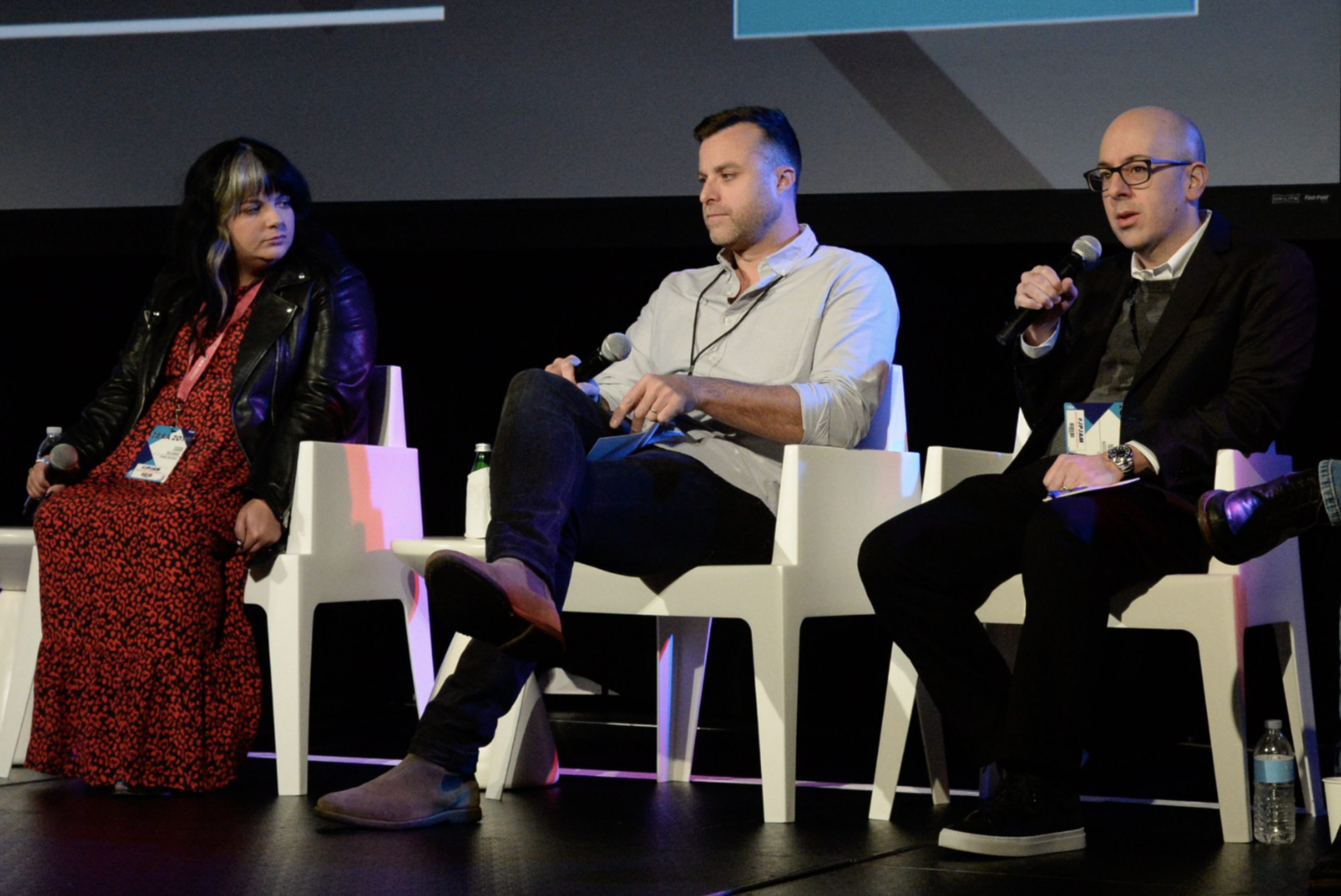Agents Power Panel
Panelists:
Sara Bollwinkel, Paradigm Talent Agency
Bruno del Granado, CAA
Joe Fucigna & Phil Battiato, UTA
Matthew Morgan, WME
Nick Nuciforo, UTA
Moderated by:
Sally Williams, Live Nation
Signing and Developing Artists
The discussion began with panelists describing what drives their individual decisions to sign clients. Sara Bollwinkel recalled how she discovered meteoric superstar Billie Eilish: “Someone sent me a Soundcloud link for “Ocean Eyes,” five years ago. I couldn’t sleep – I was just firing off emails in the middle of the night to find a way to meet this human. She is so strange and she’s wonderful. I am not the agent who signs things as a business decision. I only sign artists that I love.”
Matthew Morgan follows the same principle. Without a true passion for the creator’s art, he believes your hard work may not be enough. “We all know how tough it is to break someone, regardless of their talent,” he said. “If it’s not the right timing and not the right team, it can be a really difficult grind.”
Nick Nuciforo acknowledged the rigorous crucible of a comedian’s development. “It’s the 10,000 hours theory. When you think about the people who have really broken over the last four or five years, it’s not overnight success. It’s 10+ years for most of these people, so you get to know the people in the comedy community.”
The panelists agreed that a strong team behind the artist can make the difference when considering whether to sign. “I especially like to have a very strong management team,” said Bruno del Granado. “I managed Ricky Martin for ten years. I know that a manager can be your greatest ally or your biggest hindrance. The talent must be surrounded by a great team.”
Beyond an appreciation for the artist’s work and a strong team in place, Joe Fucigna and Phil Battiato dive into analytics to help inform their decisions, especially since their clients typically come from established digital platforms. The magic word? Engagement. “It’s easy to have large numbers and a passive following,” said Battiato. “But are [the fans] commenting on and sharing posts? Are they buying merch? That’s a good sign that they’re going to buy a ticket or attend an event, even if the audience itself is on the smaller side.”
How to Get the Show
Moderator Sally Williams asked the panel not only how they choose promoter and venue partners, but also how those partners can be better prepared. Bollwinkel stated that she has a preference for early believers, “They believe in the act before they’re making any money, during a time when it’s an investment for everybody.” She told the story of how Tulsa’s BOK Center secured a date on Billie Eilish’s arena tour. “They sent a video of one of the cast members from The Office, a show that Billie is obsessed with,” she said. “In the video, the character Kevin asks Billie to come to the BOK Center. It was so strange, but I sent it to Billie and she said ‘Alright dude, let’s go.’”
An understanding promoter with a multicultural toolkit goes to the top of del Granado’s list. “I love dealing with promoters who are not only interested and engaged with the artist, but know our market – people who know the difference between doing a buy on the Top 40 station and doing a buy the AM station that plays regional Mexican music, where our fans are going to be.” He pointed to other nuances of the Latin market: a lower median fan age and the particular distribution of cultures within a regional. “It begins with diversity and hiring the right team who comes from that area of the business,” he said.
Educating Buyers & Promoters About Nontraditional Content
One of the biggest challenges of promoting nontraditional events is making sure the venue and promoter understand the artist’s vision for the show and communicate that vision properly to the fans. Fucigna and Battiato specialize in launching first-time shows and tours for this new wave of talent and put extra effort into educating their buyers. “I would say 90% of the things that we’re coming to them with have no touring history,” said Fucigna. “I explain that [the artist’s] brand is huge and that we believe they’re going to sell a lot of tickets. There will be some losses – and we will deal with those gracefully – but there will be a lot of wins too.” He commended the buyers in the room for being willing to take the risk. “Your partnership is huge for us.”
Battiato pointed out that, for many of their clients, touring is a secondary source of income and taking time away from their usual schedule can be a tough sell. Therefore, negotiating the deal can be more challenging for buyers. “We take time to explain this to our partners, to make sure they’re putting enough money into an offer so that the talent will say yes. It’s such a different piece of our business – just getting the tour confirmed without overleveraging promoters. It is an art we’ve been working on.”
Williams made the observation that having nontraditional content can open access to new demographics for promoters and venues. Fucigna agreed, sharing examples of YouTubers Rhett & Link playing the North Carolina State Fair and setting the fair’s record for highest attendance at a single event. “These are people who are walking through the doors that normally wouldn’t be there,” he said. “We often hear this from buyers, ‘I had no idea what you were selling me, but that was the fastest sell-out I’ve ever seen.’”
Dynamic Pricing and Pricing That’s Right for the Artist and Genre
Morgan feels the tension between minimizing scalper opportunities and pricing shows affordably for fans. Flexibility has allowed him to satisfy demand for super premium experiences and affords the opportunity to tune prices down on lower-tier tickets. Billie Eilish has been an especially interesting case study for pricing. Bollwinkel elaborated, “Billie’s whole mantra is: three years ago, she wouldn’t have been able to afford tickets to her own show. She doesn’t come from money. To this day, she still lives in a 1,200 sq ft house with her parents. We always want there to be a $39.50, which is still very expensive for some people.” To create more opportunity for her fans, Billie has worked with Global Citizen to allow fans to earn tickets to her shows by volunteering to help environmental causes, community service, and even local government. “For her, it’s taking control of the situation and giving money where she feels it needs to go. It’s either going to a strange man in a basement, or we can do something good with it.”
Fucigna and Battiato believe that the messaging around Ticketmaster Platinum and the secondary market could be improved, which might lead to less confusion among fans. “When they see a ticket for $500 on Stubhub, the fan assumes it’s a scalper. When they see a $500 ticket on Ticketmaster, they assume that one of our clients is charging $500.” Misinformation can spread quickly. “Especially with our audience,” Battiato said. “They’re very active on social.”
Recent immigration concerns in the U.S. have led to “soft” ticket sales in the Latin genre, according to del Granado. He has seen the need to leverage dynamic pricing for tickets after P1. “Latinos overall earn less than the general population, so we keep that in mind,” he said. “Plus, people are genuinely scared to go to shows if they see or hear about children or their parents being taken away in their area. That is certainly playing a huge role in what is going on with Latin touring this year.”
On the comedy front, Nuciforo believes that Netflix, Amazon, and the forthcoming HBOMax will continue to be a boon for the genre. “They are aggressively pursuing standup specials. Our artists love getting their work out in front of the masses – it’s very good for us.” He is planning for strong growth around clients Nate Bargatze and Bert Kriescher, currently on their first major tours. “Some names to jot down that I think you’re going to hear more about in the next year: Nikki Glaser, Michelle Wolf, Dan Soder, Sal Vulcano, and Whitney Cummings.”
Morgan called Summer Walker and The Hu “green bananas,” while Bollwinkel pointed to strong initial buzz around Billie Eilish’s brother, Finneas, who has served as producer and co-writer on her projects. “He put six shows on sale and all of them sold out in under five minutes.”
Battiato and Fucigna have seen promising numbers from client Heather McMahan, a comedian with a #1 podcast and an especially energized fanbase. They also oversaw successful launches of tours for Tiny Meat Gang, Blippi, Stassi Schroeder, and Crime Junkie and are organizing another round of big projects for them in 2020.





